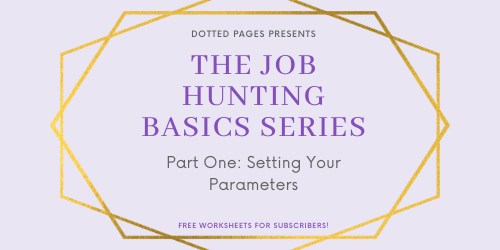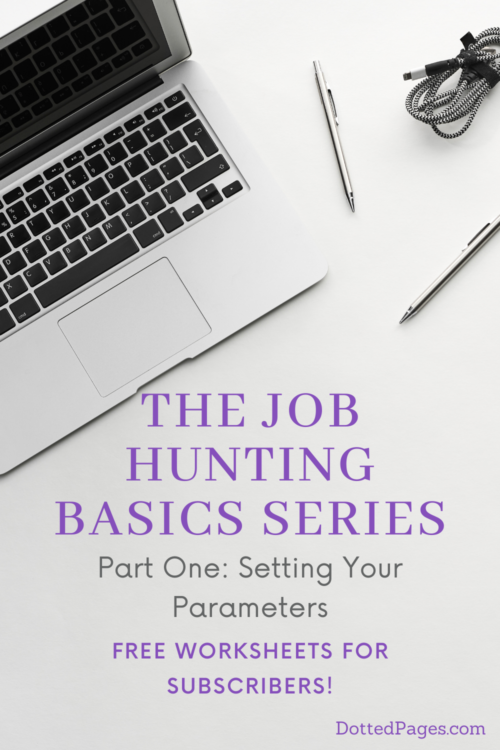Welcome to my post series on planning and organising your latest job search! This week we’re covering part of the job hunting basics, Setting Parameters for your Job Search!

If you have had to search for work recently, you’ll know that job hunting is no easy task. For most of us, the days of walking into a life-long career are gone. Instead, we face an endless slog of applications, most of which we’ll never hear back about. If this sounds familiar, don’t worry, I know your pain! While job hunting will never be straightforward, I have some planning advice that should help you get some traction. I’m also sharing a free Planner & Tracker download, to help kick off your job search in style!
In this Post Series:
- Part One: Setting Job Search Parameters
- Part Two: Creating a Great CV (or Resume)
- Part Three: Know Your Worth
- Part Four: Interview Advice
- Part Five: My Personal Job Hunting Tips
Job Hunting Basics: Setting your Parameters
There are some pretty essential steps for starting a job search. Firstly, you need to know what you’re looking for. This is really important; without a rough idea of job title, industry and location, you can’t search efficiently for roles that may suit you! While some career paths may be more flexible than others, for example as an administrator, I don’t need to specify an industry, it’s essential to have an idea of what to search for.
I think there are six key factors you need to decide before you start your job hunt. These are role, salary, hours, industry, location and notice period. If you don’t know what these are, you can’t search efficiently. There are no point spending hours on job applications for a role that’s too far away, doesn’t pay enough to cover your living expenses or requires an immediate start but you have to give a month’s notice!
Parameter One: Role (or Job Title)
The role you are searching for is really important. Without it, you can’t trawl online search engines or set up alerts. While this may be a simple task if you have a specific skill-set such as chef, it can be tricky if you’re not sure what you want to do. If that’s the case for you, do some research about what jobs you’d like to do, or use your previous job title- if it’s a role you’d like to keep doing.
Parameter Two: Salary
Salary is an essential parameter to establish. Ideally, every time you change jobs, you should be looking to be paid more than your previous role. The exception to this is if you’re moving to a low-paying industry that you’re hugely passionate about!
Unfortunately, a lot of jobs are advertised without a salary. This can make deciding what to apply for difficult. If you’re unsure, it’s easy to look for the average salaries for the roles you’re applying for to give you a rough idea of pay levels. Ultimately, you need to have a minimum figure to aim for; any lower and you’re unable to pay your bills- let alone save or splurge! Don’t apply for anything below this figure and, if you’re ever asked about your salary expectations, have a higher figure in mind!
Also, keep in mind that salaries are measured differently depending on work type and industry. Know your minimum and ideal figures in both annual and hourly rates, so you know what to look for.
Parameter Three: Hours
How much are you looking to work? Searching and applying for full-time roles when you can only work three days a week is a waste of your time- and the recruiters. Conversely, if you’re used to a full-time income, a part-time one may not meet your minimum requirements. Make sure you know how many hours you can afford to work a week while meeting financial obligations and still (hopefully) maintaining some kind of work/life balance!
Parameter Four: Industry
Depending on the type of work you’re looking for, the industry can be hugely important or almost irrelevant. For specialised work such as hospitality, or logistics, the industry you search may be far more important the exact role. On the other hand, for generic office or phone roles, the business sector doesn’t matter- unless you have a personal preference.
Searching by industry is also a great way to discover roles you never knew existed, so if a particular industry interests you, it can be a good idea to investigate what it has to offer.
Parameter Five: Location
How far are you willing to travel to work? If you’re reliant on public transport or foot power, how far can you reasonably travel? Working close to home saves on travel costs and time, but you need to have a reasonable radius to look for work in. As with role and industry, deciding a location to search is vital for your job hunting.
If you’re a specialist in your field, how far would you be willing to travel for a higher salary? If you don’t own a vehicle, is a workplace accessible by other means? These questions are also important to consider when looking at applying for various positions.
Parameter Six: Notice Period
How soon can you start a new job? If you’re still employed or are moving, your notice period will depend on your current contract or your move date. If you’re already between jobs, how long can you afford to be unemployed? Either way, you need a rough idea of when you can start in a new role; it’s a common interview question and a lot of job search sites also have it as part of their profile questions.
Setting Parameters: In conclusion…
If you start your job hunt with rough answers to the six parameters I’ve outlined above, you’ll know exactly where to start looking. Not only that but when you get a job offer, you can measure it against your needs. Knowing the minimum salary you need or the maximum distance you’re willing to travel empowers you as a job seeker. I’ve been there, we need all the empowerment we can get!
If you want more job hunting tips and advice, including CV ideas, check out my latest Pinterest board. Otherwise, I hope this was helpful and don’t forget to subscribe below to receive your FREE job hunting planner & tracker printable worksheets!
Check out the Series:
- Part One: Setting Job Search Parameters
- Part Two: Creating a Great CV (or Resume)
- Part Three: Know Your Worth
- Part Four: Interview Advice
- Part Five: My Personal Job Hunting Tips (Coming Soon!)

